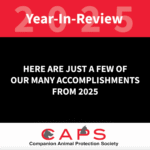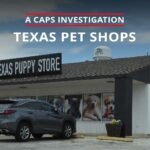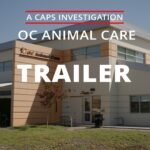Petland Las Vegas
8800 W Charleston Blvd #3
Las Vegas, NV 89145
(702) 945-0363
Date and time of CAPS investigation: 6/25/25; 3:37 pm PST
Date and time of CAPS investigation: 6/27/25; 7:37 pm PST
Approximate number of puppies observed at time of 6/25/25 investigation: 54 puppies, 4 kittens
June 25, 2025
Immediately upon entering the store there were open-top, elevated enclosures on the store floor with ferrets, gerbils, mice, and/or similar animals to the right. Adjacent to and a few steps ahead of them were body-length enclosures for birds. And a few more steps ahead was enriched housing for four cats.
On part of the back wall and left wall were stacked two rows of 14 enclosures each. Each enclosure had a glass front, metal rods in the back, and grated flooring, with some toys or enrichment for the puppies. Most enclosures housed two or three puppies, except for a few that housed only one in the case of larger breeds. Prices ranged from $1,800 up to $4,000-$5,000. No breeder information or sign informing customers of their right to receive information about the puppies’ source, origin, and medical history, as required by Nevada law, was visible.
I told an employee named Ashley, who later told me she had only been at Petland for three weeks, that I was looking for a bigger dog. Eventually, I focused my attention and playtime on a black and reddish-brown female Australian Cattle Dog, who was just over 3.5 months old, cost $2,999 and had been there since May 14. When I told Ashley that I did not have an ID required by the store to play with a puppy, she sought the manager’s permission, which the manager first denied. While I was talking to Ashley, who was playing with the puppy, the manager said Ashley could allow me to play with the puppy, given my level of interest. Ashley mentioned was that the store did “special orders” for puppies, which required a $250 non-refundable deposit.
After Ashley put the puppy away, I obtained more information. She mentioned a 14-day health guarantee and a one-year hereditary and congenital health guarantee up to the cost of the dog. The store manager, who later said her name was Natalie, came over to join the conversation, and we discussed financing options
I requested the name of the breeder. Ashley said, “They’re always inspected, so like we go inspect them like four times a month.” When I asked if they know the breeders, Ashley stated “Yea, we pick them, if we see any sign like they’re not following, they’re all licensed too.” She added, “AKC is inspecting they, they’re all AKC, like, affiliated breeders.”
Ashley informed me that the puppy’s paperwork would include the breeder information. Ashley offered to print a copy of the breeder information because my phone battery had died. She provided me with a copy of a document entitled “Family Photos” that had a photo of the parents and the puppy and of the owner of the facility, Arba K. Jett, Country Best Friends, posing with cattle. A breed of record certificate showed Jett as the breeder and Pinnacle Pet as the distributor (broker
In the meantime, Natalie came back to talk with me, Natalie explained that all of their breeders were USDA-certified and Canine Care Certified. Natalie stated that the USDA certification meant that “they have to be inspected multiple times a year. If they fail an inspection they can’t breed at all. They get like their whole licenses revoked, things like that.”
Natalie said that Canine Care Certification meant that breeders are required to “have better licenses, they do more basically, so open kennels, heated kennels, they introduce them to like gravel, grass, like, they go above and beyond. They’re your top breeders.” She then pointed me to their breeder video and then repeated that “they have to be inspected multiple times a year in order to be bred.”
I asked if the owners of the store visit the breeders, and Natalie said, “Yep, my best friend worked here for twelve years; she’s been on five breeder trips. And then I actually came from Henderson; we did a few breeder trips over there as well.” I asked if the breeders are in Nevada or out of state, she said they’re all over the country, but because of Nevada’s dry climate most breeders were out of state. She continued that the dogs were driven out to the store in “these big vans” that “have kennels in it.” She explained that “the puppies are with the breeder first, then they go to the distributor, the distributor does their vaccinations for their first rounds, and they’re dispersed to their respective stores.”
I asked how many times the breeding dogs are bred. Natalie said that they don’t get that information, but “they can’t overbreed because they’re licensed and have to get inspected.” I asked what happens to the dogs once they’re done breeding. Natalie said, “Those are the breeders’ dogs; those are their like family dogs. You’ll see that any breeder does that, not just our breeders. Any backyard breeder will do that as well; they’ll sell the puppies but keep the dogs. But there’s only certain amount of times that you can re-breed a dog. I want to say it’s like two or three times and I think that’s it.”
After speaking with Ashley for a few more minutes, I left the store.
June 27, 2025
After looking at the Cattle Dog again with Ashley, I spoke with another manager named Michaela. I told Michaela I wanted more information on the source of the dogs. Michaela immediately said, “All of our puppies are USDA-licensed, if not also Canine Care Certified, which means that they have to come from USDA-licensed breeders, comes right from the District [Department] of Agriculture. They can’t breed the moms more than once or twice. They can’t use cages, has to be like playpens, open fields only, and they have to have at least five acres of land. Most of them have 25-plus [dogs].” When I asked if the dogs get to be inside and outside, she said yes.
Michaela continued, “Our store owner has to go in person and meet with the breeders first before we can start working with them. Animal control and the city has to meet with them multiple times a week in order to make sure the facilities are up to date.” She showed me the breeder videos playing to show where the puppies came from, saying “it is a lot of like family-raised, farmland, stuff like that.”
She said the “Midwest is a hot spot to get them from there” because “it’s easier to get that much land out there so that’s usually where they’re coming from.” I then asked again if they’re not puppy mills, and she replied “nothing like that. The city really cracked down on it. I probably would say that six years ago, maybe” more dogs came from puppy mills because “there wasn’t as many laws and stuff like that. But the city came after pet stores [saying] we want to shut them all down, and pet stores came back and were like what if we follow x, y, and z as our ordinance…. And that’s why we send you home with spay and neuter, they’re microchipped, and all that. It’s cause the city was like we won’t shut you down, but you have to follow these laws. And so, any pet store in the city, they’ll follow the same kind of protocols.”
Recapping the information, I asked what happens to the dogs once they stop breeding. Michaela replied, “It depends. A lot of time, they’ll just keep them as a family; other times they will give them away.” She also confirmed that the dogs are driven to the store on a truck, not flown. Michaela explained that “it’s babysat, it’s nannied, its air-conditioned, someone is with them at all times. They come on a 48-hour drive all the way out of the Midwest to here.” She explained that the puppies arrive on a Tuesday and go out onto the floor the following Friday, and in between a vet sees them “three times a day” and they get dewormed and vaccinated.
Also recapping, I asked again what USDA-certified meant in terms of how often they get checked. Michaela replied that “I believe it’s once a week…. Somebody from the city goes in and checks the facilities, and they have a “whole 11-page pamphlet, and they make sure they’re following everything by the book, every time. And they don’t know when they’re going to show up. They could show up on a Monday, sometimes they show up on a Sunday, sometimes it’s a Thursday, so they kind of have to be on everything at all time.” As she was stating this. I asked once more for her to confirm that she was referring to the USDA and these inspections were once per week, and she affirmed both. Michaela ended by saying “they’re really really well bred.”
After looking at a few more dogs and speaking to a couple of the employees, I left the store.
Breeder and broker names obtained during investigation
Arba K. Jett, Country Best Friends, 449327 U.S. Hwy. 64, Vian, Oklahoma 74962, 73-A-2089, 97 adults and 73 puppies at 12/10/24 USDA inspection (Australian Cattle Dog)
Pinnacle Pet, 11474 Hammer Road, Neosho, MO 64850, 43-B-3750
Broker names obtained from 2025 Certificates of Veterinary Inspection
Pinnacle Pet, Neosho, MO, 43-B-3750, 138 puppies and 18 ferrets at 8/18/25 USDA inspection
A CAPS investigation of Pinnacle Pet
Conrad’s Cuddly Canines, Frankford, MO, 43-B-3659, 20 puppies at 8/23/24 USDA inspection
Breeder names obtained from 2025 Certificates of Veterinary Inspection
Bunny Trembler, Niangua, MO, 43-B-3321(cat breeder), 34 cats and 38 kittens at 8/20/25 USDA inspeciton
Bunny Trembler investigation report and video
Evidence contradicting statements made by the employee
The number of times that Petland and USDA inspect breeders
Ashley claimed that Petland inspects breeders “like four times a month.” Natalie stated that the USDA certification meant that “they have to be inspected multiple times a year. If they fail an inspection they can’t breed at all. They get like their whole licenses revoked, things like that.” These statements are false. Petland does not inspect the puppy mills supplying puppies to their store. In addition, USDA inspects dog breeders and brokers around once a year, sometimes going even longer between inspections. The only time a licensed facility may get another inspection within a year is if the inspector returns to see if violations have been corrected. USDA does pass or fail licensees. If a facility owner has ongoing, serious violations, USDA may fine or temporarily suspend his/her license. On rare occasions, USDA will terminate or revoke a license, but this has to be done through an administrative court. Petland picks the breeder, who are all AKC-affiliated
Ashley’s allegation that the store picks the breeders and, if we see any sign like they’re not following, they’re all licensed too.” She continued that “AKC is inspecting they, they’re all AKC, like, affiliated breeders.” Petland Las Vegas uses brokers like Pinnacle Pet and Conrad’s Cuddly Canines, which obtain the puppies who get transported to the store. Pinnacle Pet sources from many hundreds of breeders. Which breeders’ dogs end up at what pet shops is not planned. While some of the puppies at Petland Las Vegas may be AKC registerable, many of them have registries associated with puppy mills, such as ACA or APRI.
USDA-licensed breeders cannot overbreed their dogs
Natalie’s claim that the breeders can’t overbreed because they’re licensed and have to get inspected is untrue. The Animal Welfare Act has no rules about overbreeding.
Breeding dogs are like family dogs and are retired after having just a few litters
She also insisted that the breeding dogs are like family dogs, and that the breeders sell the puppies but keep the dogs. She also said breeders could breed a female dog two or three times, while Michaela claimed the females could only be bred once or twice, before breeders retire them. These statements are erroneous. Commercial breeders usually sell retired breeding dogs at auctions or have them euthanized (or even shoot them in the head). Some work with rescues. Puppy mill breeders usually breed female dogs on every heat, which is twice a year, and don’t retire them after two or three litters of puppies. They use breeding dogs for as long as they produce large enough litters of puppies to sell to pet shops or online.
USDA-licensed breeders cannot use cages and need to have at least five acres
Michaela alleged that breeders “can’t use cages, has to be like playpens, open fields only, and they have to have at least five acres of land. Most of them have 25-plus [dogs].” She said that dogs have to be inside and outside. All of these statements are untrue except that most breeders do have more than 25 breeding dogs. Almost all USDA licensed facilities use cages and kennels, some with outdoor access, which is usually not sufficient, especially for larger dogs. The Animal Welfare Act does not require that a breeder have a certain number of acres. While dogs may have access to an indoor barn or shed-like building, they don’t get to live in the house. Puppy mills raise dogs in livestock-like conditions.
Petland’s owner meets the breeders first before they can work with the store, and local agencies inspect these breeders
Michaela also insisted that Petland’s owner has to go in person and meet with the breeders first before we can start working with them. She also claimed that animal control and the city has to meet with them multiple times a week in order to make sure the facilities are up to date. Petland franchise owners may, in fact, visit some of the brokers who supply their stores with puppies. It is rare that they meet breeders, and they certainly do not meet with every single breeder before they start working with them. As stated above, Petland Las Vegas is mostly using brokers that source puppies directly from the breeders. Local animal controls and city officials do not inspect USDA-licensed facilities. States like Missouri, Kansas, Oklahoma, Ohio, Wisconsin, Illinois, Pennsylvania, Nebraska, and Texas have state licensing and inspection programs. CAPS often relies on their inspection reports for violations since USDA inspectors are very lax.
Petland’s misleading breeder videos
Michaela showed the videos that play in pretty much every Petland franchise of puppies playing with Amish children and running in fields, claiming that “it is a lot of like family-raised, farmland, stuff like that.” While a few facilities may look like this, most of them are large commercial livestock operations.
Petland Las Vegas does not use puppy mills Michaela’s claim that Petland Las Vegas does not obtain puppies from mills is an outright lie. CAPS investigations of some of Pinnacle Pet’s breeders prove these facilities are mills. Moreover, CAPS has investigated several USDA-licensed kitten mills, such as Bunny Trembler’s facility. Our evidence shows that Trembler is clearly running a mill. Her insistence that the puppies “really really well-bred” is also false. Puppy mills breed for profit, not for breeding standards. Puppies are babysat while being transported to pet shops Michaela’s statement that the puppies are babysat and nannied is misleading. Puppies are transported in vans and large transport trucks that have rows of stacked cages. There are no babysitters are nannies. There is a driver and perhaps a kennel worker. CAPS’ lead investigator worked undercover at The Hunte Corporation, the largest brokerage facility in the country, for six months. Hunte had its own large transport trucks.
A Las Vegas couple, Carolyn Luke and Timothy Miller, was charged with felony animal cruelty and convicted in an animal hoarding case that involved over a hundred animals, many of which were purchased from Petland Las Vegas.
Animal advocates claim the couple purchased over 30 dogs from the Petland Las Vegas (Boca Park mall) location, even allegedly telling store staff some of the animals were dying. Despite this, Petland allowed them to purchase more animals.
The investigation began when police in Boulder City, Nevada, pulled over the couple’s car and found more than 50 animals, including guinea pigs and rabbits, some dead, inside plastic totes and luggage. Subsequent search warrants at their Spring Valley home and a La Quinta hotel room in Summerlin, Nevada, uncovered more animals, including 30 dogs in the hotel room, 10 of which were deceased.
The couple faced numerous charges, including 14 initial felony animal cruelty charges, with more added later. In May 2025, they were convicted and received suspended sentences of 18 months of probation and were banned from having contact with animals.
The case prompted Councilmember Victoria Seaman to propose an ordinance, which passed in January 2025, which stiffen the penalties for animal dumping in the city and limits pet shops to selling six animals a year to one household. https://www.youtube.com/watch?v=QmkLTTCM944
Owner of Petland Las Vegas Pupeez, Inc., the franchise owner for Petland Las Vegas, filed for Chapter 11 bankruptcy in July 2025. They also own a Petland in Tucson, Arizona, which is listed online as being temporarily closed. Orange Grove Center sued Pupeez, Inc. in August 2025, which could be for owed rent. Pupeez also used to own a Petland franchise in Scottsdale, Arizona.



